Back when I started this site, I knew the content would be largely “genre”-oriented. I’d have wagered the content would be roughly 1/3 Mystery/Detective fiction, 1/3 Urban Fantasy, and slightly less than 1/3 SFF, with “non-genre” fiction, humor, and non-fiction being enough to make my one-thirds just an approximation (honestly, if you asked me what I read regularly, that’s pretty much how I’d describe it today). Actual numbers show that’s wrong—yes, it’s about 1/3 Crime/Thriller Fiction, but Urban Fantasy has only topped 20% once in the last decade (usually hovering around 15%), SFF combine for about 20%.
Which is just a long-winded way to get to these two points: because Crime Fiction takes such a big chunk of my reading, it gets its own Best-Of list, but none of the others really garner enough numbers for their own. Also? The fact that this list is 50% Urban Fantasy makes me happy. I may not read as much of it as I think that I do, but it clearly resonates with me as much as I think it does.
So much for me 2-3 sentence intro, eh? This might be why it took me 5 days after settling the list to get it posted.
As always, re-reads don’t count (if for no other reason I could just cheat—don’t want to stress out about this list? Easy, each year read 2 Nick Hornby books, a couple of Troppers, Harper Lee, Changes by Butcher…and a couple of other standby’s and recycle the same list every year).
(in alphabetical order by author)
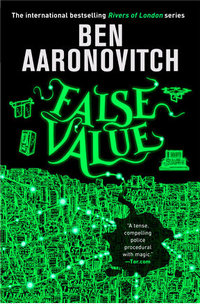 False Value
False Value
My original post
After wrapping up the overarching plotline from books 1-7, what do you do for book 8? Something completely different. If you were to draw a Venn diagram with circles for Charles Babbage/Ada Lovelace, Artificial General Intelligence, and Wizardry—the overlap is where you’d False Value. Who wants more? The mix of contemporary cutting-edge technologies and Newtonian magic is just fantastic.
Throw in more Hitchhiker’s Guide to the Galaxy references than is healthy and you’ve got yourself a winner.


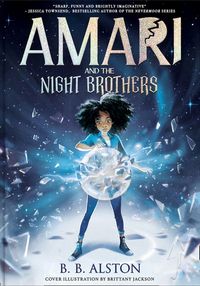 Amari and the Night Brothers
Amari and the Night Brothers
by B. B. Alston
My original post
I’m a tiny bit worried that recency bias got this one on the list. But, I’m not going to lose sleep over it.
This is a delightful story about a young girl from the “wrong” part of Atlanta being recruited by her missing/presumed dead brother into a Hogwarts/MIB mashup, overcoming odds, making friends, saving the day by doing all the sorts of things that young teen protagonists have to do (with a little support from the grown-ups who are supposed to be stopping her), but mostly through grit. The book is written with a sense of joy and hope, while never losing sight of what Amari has to overcome in terms of her own circumstances as well as the specific villainy.
Also, and I can’t stress this enough, there’s a weredragon. What more do you need?


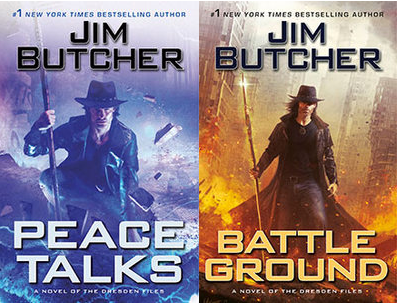 Peace Talks/Battle Ground
Peace Talks/Battle Ground
by Jim Butcher
My original Peace Talks post
It wouldn’t be fair to either book to just pick one of the two Dresden Files novels published in 2020, and these were originally written as one book, so this isn’t cheating. I laughed, I giggled, I got scared on behalf of fictional beings (and remain that way), I was awed, I was saddened, and I cried more than once. And I’m not going to think about that last bit anymore, because I have things to today.
They aren’t perfect, I know I’ve said I can’t read these books uncritically, but even I can see a problem or two with these books. But I just don’t care. Those problems don’t even amount to one bean in Rick Blaine’s proverbial hill compared to what I loved about the books.


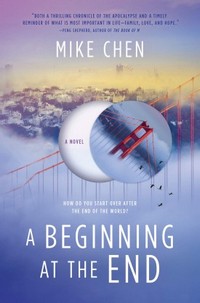 A Beginning At The End
A Beginning At The End
by Mike Chen
My original post
Chen makes his second appearance on this list in two years (and there’s a pretty good reason to think he’ll return). I’m sure he’d rather have not kicked off 2020 by publishing a novel about a global pandemic in hindsight, but it’s too late for that.
Chen’s trademark appears to be writing non-SF stories in SF settings. As society tries to rebuild itself after most of the world’s population was wiped out, we focus on four people trying to establish some sort of life for themselves. It’s about being trapped and defined by our past, and about making choices to change our present, with hope for the future. Told with heart, wit, and skill—Chen’s characters will grab you and won’t let you go.
I’m not sure these two paragraphs were helpful. Go click the link above and read a few more words about it.


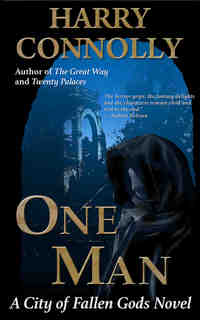 One Man
One Man
My original post
A PI story in a Fantasy world is becoming enough of a common thing to stop readers in their tracks by itself. Now, you have to make it a good PI story in a Fantasy world. This one works as a Fantasy and a noir PI novel.
A man haunted by his horrible past, just trying to get by, is pushed into a gang war by being in the wrong place at the wrong time and befriending the right little girl in need of an adult looking after her. Intricate magic, elaborate world building, horrible villains, tarnished (at best) heroes. This is a novel to chew on and relish.


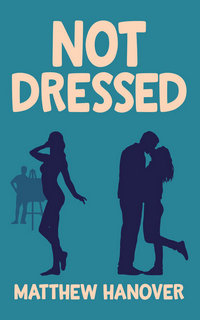 Not Dressed
Not Dressed
My original post
This is a dollop of sweetness on the other hand. The protagonist (Jake) we have here is in a stagnant (at best) long-term relationship that’s got a couple of pretty big things to work through; and is in a job situation that needs addressing. Then he makes a new friend who quickly becomes the only positive thing in his life. Jake’s life is basically begging to be shaken up, is Kaylee going to help instigate that?
This book is effortless to read. It’s funny, it’s sweet, it’s infectious, it’s engaging as anything I can remember. I cared about these characters and got invested in their lives faster than I typically do. And thinking about them now, over a year after I read the book, still brings a grin to my face.


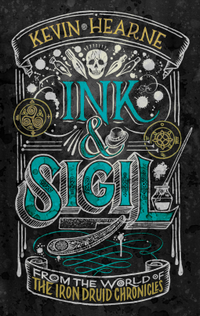 Ink & Sigil
Ink & Sigil
by Kevin Hearne
My original post
Yes, this is an Iron Druid spinoff and clearly exists in that world. But it’s nothing like an Iron Druid novel. You’ve got a cantakerous, aged, protagonist; fantastically designed and a-typical sidekicks/associates, with a magic system that I don’t has a predecessor in UF. If Aloysius MacBharrais isn’t one of your favorite characters in fiction right now, that’s only because you haven’t met him yet.
And it’s funny. Not to the detriment of action and drama, but filled with laughs. I’m not sure what else to say without going on for another 700+ words, so I’ll just leave it at that (and with the link above).


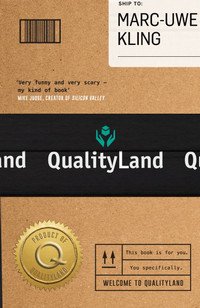 QualityLand
QualityLand
by Marc-Uwe Kling, Jamie Lee Searle (Translator)
My original post
The most realistic dystopian novel that I can think of. Also the most satiric, which helps you read it without despairing.
The Algorithm runs your life—it gives you what you want and need (even if, especially if, you don’t realize you need/want it), it determines your friends and relationships, it does everything for you but breathe and eat. Please rate it five stars. Or be prepared to suffer the consequences.
And it’s an election year. With an AI-generated candidate facing off against the incumbent. Which proves to be a lot more unpredictable than anyone could guess.


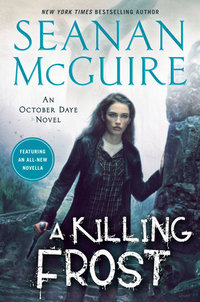 A Killing Frost
A Killing Frost
My original post
The number of on-going arcs that are resolved/permanently altered/kicked off in this one novel is mind-boggling. Particularly since at least one of them I didn’t expect to be really explored until McGuire kicked off her end-game for this series (so, clearly, I know nothing). She drops one of the (probably the) biggest bombs in the series—and keeps on going so much so that it’s not the climax of the novel!
It was a fun, thrilling, emotional ride even ignoring everything I just said. McGuire’s a writing monster, it’s just fun to watch her at work.


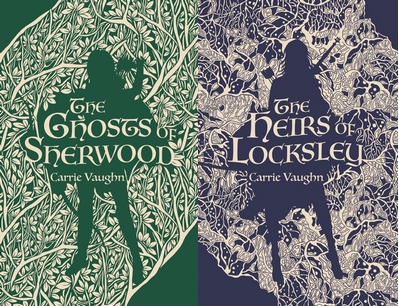 The Ghosts of Sherwood/The Heirs of Locksley
The Ghosts of Sherwood/The Heirs of Locksley
My original posts are here and here
Like the Butcher books, I couldn’t see mentioning one of this duology (which needs expanding!) without the other, making my Top 10 a Top 14. I have a degree in Liberal Arts you can’t bind me with your mathematics!
These stories about Robin and Marian’s three teen-aged kids just filled me with joy. Vaughn gave us a present in these stories—what happens after Robin and the rest win and then settle down to have a normal life? What becomes of a legend after his work is done?
More interestingly, what’s life like for the kids of a legend? What do you believe about your father (who downplays everything)? What do you do with your life to try to live up to the standard?


Books that almost made the list (links to my original posts): Highfire by Eoin Colfer, Last Stand in Lychford by Paul Cornell, and
Annihilation Aria by Michael R. Underwood (I need to finish my post about this one). ![]()



